Unit9Have you ever been to a museum.SectionA3a~3c课件2023-2024学年度人教版英语八年级下册
文档属性
| 名称 | Unit9Have you ever been to a museum.SectionA3a~3c课件2023-2024学年度人教版英语八年级下册 | 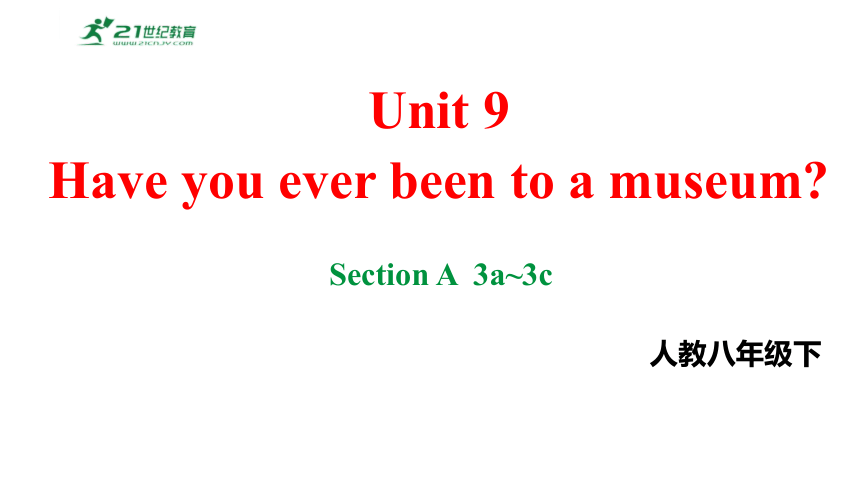 | |
| 格式 | pptx | ||
| 文件大小 | 92.3MB | ||
| 资源类型 | 试卷 | ||
| 版本资源 | 人教新目标(Go for it)版 | ||
| 科目 | 英语 | ||
| 更新时间 | 2024-04-26 15:10:45 | ||
图片预览

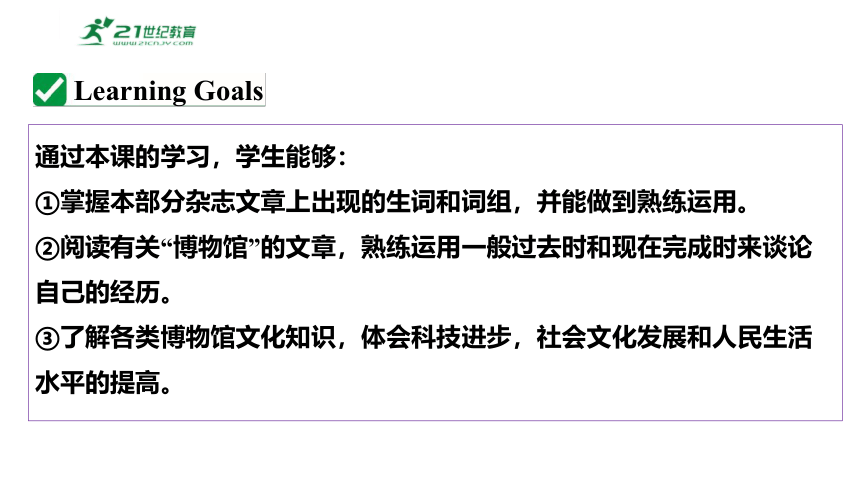
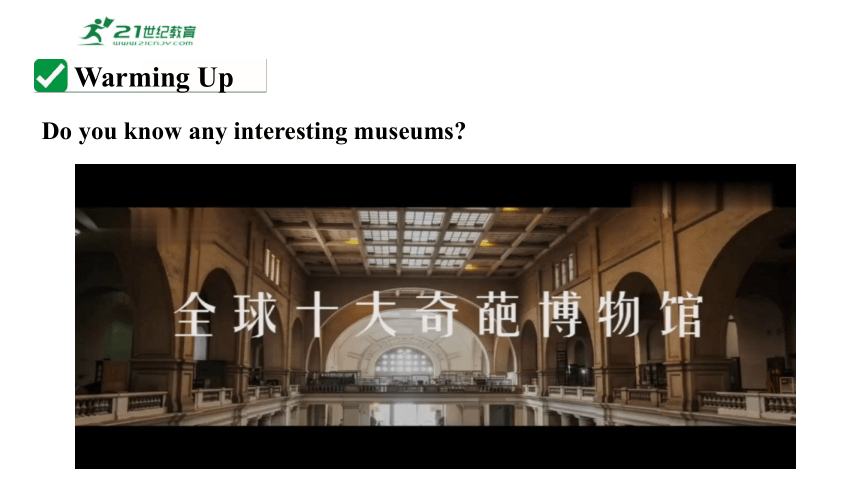
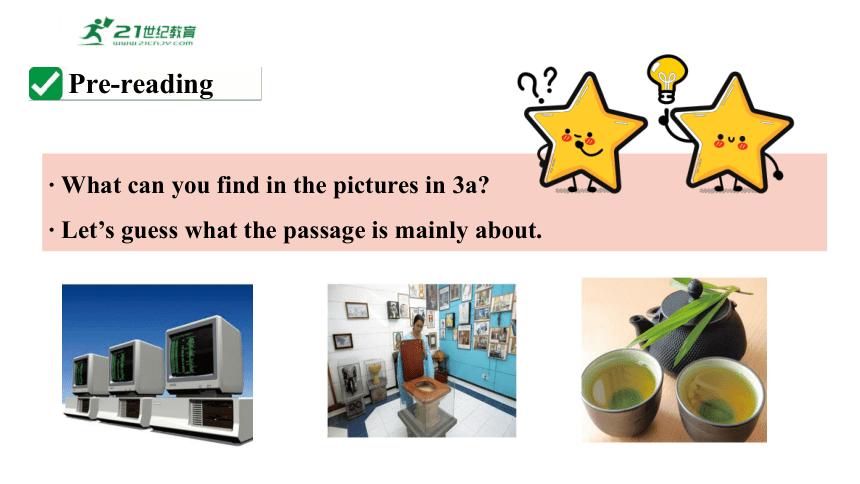
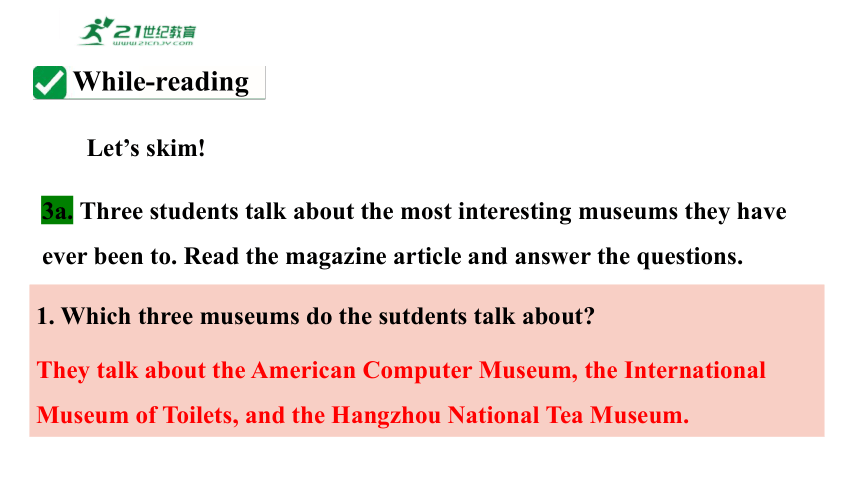
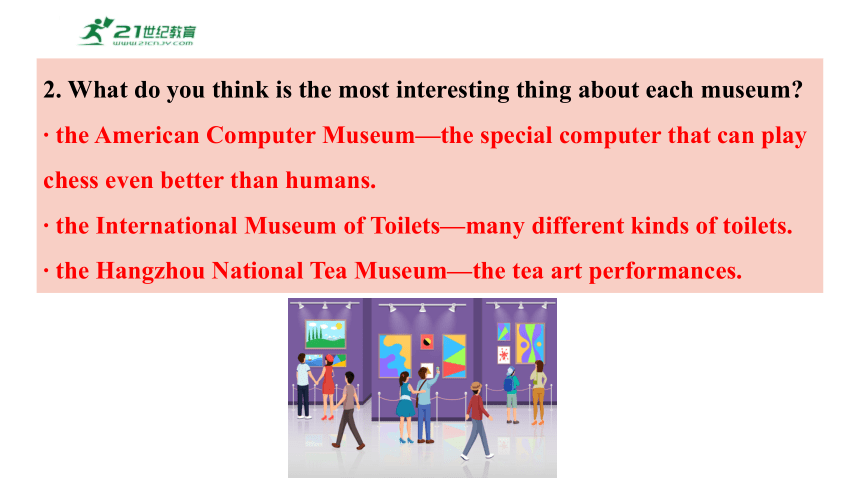
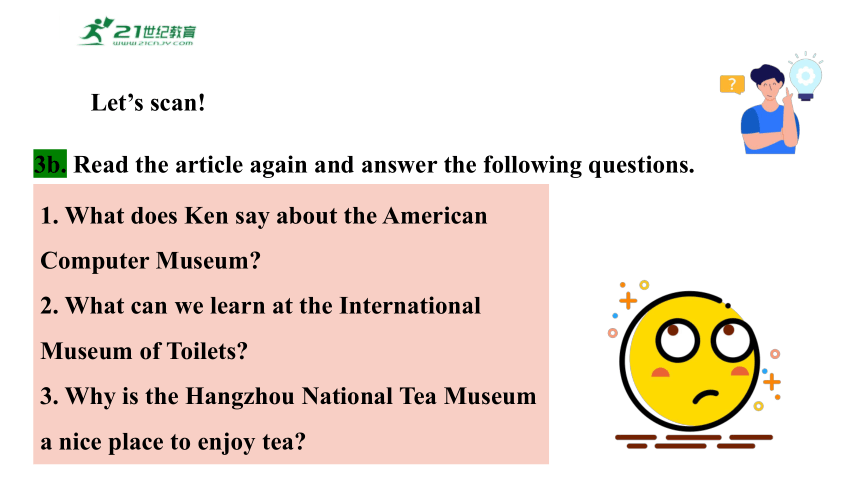
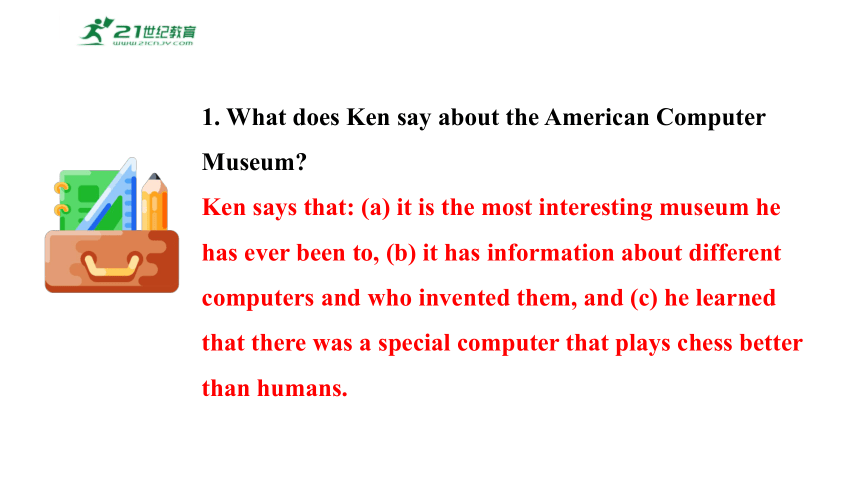
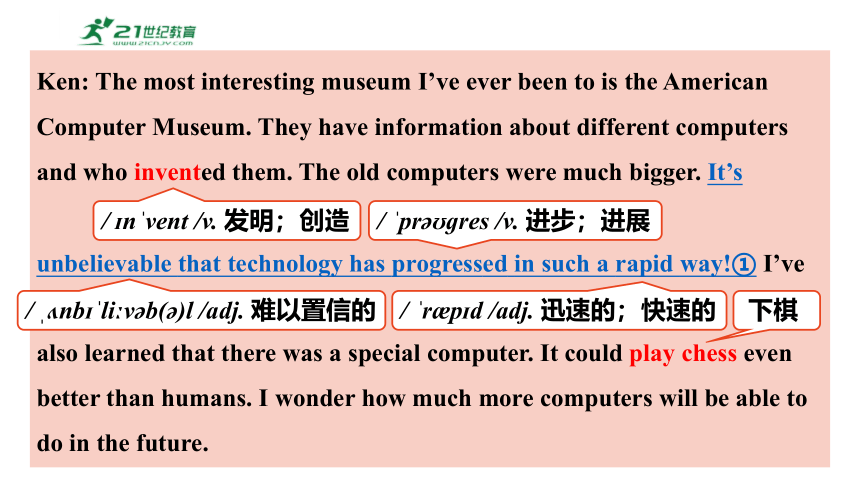
文档简介
(共27张PPT)
Unit 9
Have you ever been to a museum
人教八年级下
Section A 3a~3c
通过本课的学习,学生能够:
①掌握本部分杂志文章上出现的生词和词组,并能做到熟练运用。
②阅读有关“博物馆”的文章,熟练运用一般过去时和现在完成时来谈论自己的经历。
③了解各类博物馆文化知识,体会科技进步,社会文化发展和人民生活水平的提高。
Learning Goals
Do you know any interesting museums
Warming Up
What can you find in the pictures in 3a
Let’s guess what the passage is mainly about.
Pre-reading
Let’s skim!
3a. Three students talk about the most interesting museums they have ever been to. Read the magazine article and answer the questions.
1. Which three museums do the sutdents talk about
They talk about the American Computer Museum, the International Museum of Toilets, and the Hangzhou National Tea Museum.
While-reading
2. What do you think is the most interesting thing about each museum
the American Computer Museum—the special computer that can play chess even better than humans.
the International Museum of Toilets—many different kinds of toilets.
the Hangzhou National Tea Museum—the tea art performances.
Let’s scan!
3b. Read the article again and answer the following questions.
1. What does Ken say about the American Computer Museum
2. What can we learn at the International Museum of Toilets
3. Why is the Hangzhou National Tea Museum a nice place to enjoy tea
1. What does Ken say about the American Computer
Museum
Ken says that: (a) it is the most interesting museum he has ever been to, (b) it has information about different computers and who invented them, and (c) he learned that there was a special computer that plays chess better than humans.
Ken: The most interesting museum I’ve ever been to is the American
Computer Museum. They have information about different computers and who invented them. The old computers were much bigger. It’s
unbelievable that technology has progressed in such a rapid way!① I’ve
also learned that there was a special computer. It could play chess even
better than humans. I wonder how much more computers will be able to
do in the future.
/ n vent /v. 发明;创造
/ nb li v b( )l /adj. 难以置信的
/ pr ɡres /v. 进步;进展
/ r p d /adj. 迅速的;快速的
下棋
2. What can we learn at the International Museum of Toilets
We can learn about the history and development of toilets.
Amy: I’ve recently been to a very unusual museum in India, the International Museum of Toilets. I just couldn’t believe my eyes
when I saw so many different kinds of toilets there. The museum teaches
people about the history and development of toilets. It also encourages governments and social groups to think about ways to improve toilets in the future.②
/ t l t /n. 坐便器;抽水马桶
/ n k r d /v. 支持;鼓励;激励
/ s ( )l /adj.社会的
3. Why is the Hangzhou National Tea Museum a nice place to enjoy tea
It is a nice place to enjoy tea because it is located in a relaxing and peaceful place near a lake. Watching tea art performances is also enjoyable.
Linlin: Last year I went to the Museum. It’s a relaxing and peaceful place
near a lake. The tea art performances show how to make a perfect cup of
tea with beautiful tea sets. Watching the tea preparation is just as
enjoyable as drinking the tea itself. I’ve finally realized why my grandpa loves drinking tea and collecting tea sets.
/ pi sf( )l /adj. 安静的;平静的
茶艺表演
/ p f kt /adj. 完美的
茶具
/k lekt /v. 收藏;收集
/ t self /pron. (it的反身代词)他自己
( ) 1.American Computer Museum only has information about differentcomputers there.
( ) 2. Ken thinks computers will do more work in the future.
( ) 3.International Museum of Toilets is a very unusual museum.
( ) 4.India has the most advanced toilet.
( ) 5.Linlin didn't know why her grandpa
F
Ture or False
T
T
F
F
3c. Which of the underlined words in the passage have the following meanings
make (something) better
become better
uncommon
quiet
made
quick
improve
progressed
unusual
peaceful
invented
rapid
Post-reading
Where
Have you ever been to somewhere interesting
When
How
What
What
Yes, I have.I went to ...last month.
What do you think of the ...
What did you see and learn there
How was the ...
Have you been to any interesting places
Let’s talk!
Key Phrases
下棋 ______________________
茶艺表演 ______________________
茶具 ______________________
play chess
tea art performance
tea set
1. It’s unbelievable that technology has progressed in such a rapid way!
unbelievable adj. 非常好(或坏、极端)的;难以置信的;惊人的
e.g. We had an unbelievable (= very good) time in Paris.
我们在巴黎的日子快活极了。
The cold was unbelievable (= it was extremely cold) .
天气冷的让人难以置信。
Language Points
【拓展】
unbelievable 由“ un-(否定前缀) + believable”构成;其反义词为 believable (可信的)”。
由“un-(否定前缀)”构成的其他常见词汇有:
unable 未能;无法 unhappy 不快乐的
unknown 未知的;不出名的 unusual 不寻常的
unfriendly 不友好的 unfair 不公正的
e.g. Simon lay there, unable to move. Simon躺在那里动弹不得。
It’s so unfair! 这太不公平了!
1. Nick的吉他独奏简直妙得令人难以置信。
Nick’s guitar solos are just ________________.
2. 人们竟然能接受这种行为,我感到难以相信。
I find it ________________ that people can accept this sort of behaviour.
unbelievable
unbelievable
Instant Training
2. It also encourages governments and social groups to think about ways to improve toilets in the future.
encourage v. 支持;鼓励;激励
① encourage sb. (in sth.) 在某事上鼓励某人
e.g. My parents always encourage me in my study.
在我选择职业时父母总是鼓励我。
② encourage sb. to do sth. 鼓励某人做某事
e.g. Teachers encourage us to develop new hobbies in the new year.
老师鼓励我们在新的一年培养新的爱好。
encouragement n. 鼓舞;鼓励;起激励作用的事物
e.g. Harry needs all the support and encouragement he can get.
Harry需要所能得到的一切支持和鼓励。
Thanks to the encouragement of classmates, I become more brave.
多亏了同学们的鼓励,我变得更勇敢。
1. 对孩子表达自我的尝试,你应当加以鼓励。
You should ____________ your child’s attempts at self-expression.
2. 朋友们给了我极大的鼓励。
Friends gave me a great deal of ________________.
encourage
encouragement
Instant Training
Exercises
一、根据句意及汉语提示填写单词。
1. Teachers should (鼓励) students to solve problems by themselves.
2. Can you show me the way to the (厕所), please
3. Something (不寻常的) happened on that morning.
4. It’s (难以置信的) that the panda is eating meat.
5. Nobody is (完美的), but there is always something good we can learn from others.
encourage
toilet
unusual
unbelievable
perfect
二、根据句意及首字母提示填写单词。
1. The r change of the weather made them uncomfortable.
2. Jerry likes to c different kinds of cards. There are a lot of nice cards in his room.
3. Cathy studies hard and she is making p in math.
4. The dog found the way back home by i .
5. My grandpa enjoys the p life in the countryside but hates the noise in the city.
apid
ollect
rogress
tself
eaceful
三、根据汉语提示完成下列句子,每空一词。
1. I heard some (社会团体) also attended the meeting.
2. We learned a lot about the (茶艺) from an old farmer.
3. The Chinese teacher often (鼓励我们阅读).
4. The factory makes (不同种类的玩具).
5. Tea House is a good place (享受茶品).
social groups
tea art
encourages us to read
different kinds of toys
to enjoy tea
Summary
Three museums
Ken
the American Computer Museum
information
inventors
Linlin
relaxing and peaceful
the tea art performances
beautiful tea sets
Amy
the International Museum of Toilets
unusual
in India
toilets
governments and social groups
improve toilets
different computers
the history and development of
the Hangzhou
National Tea
Museum
Unit 9
Have you ever been to a museum
人教八年级下
Section A 3a~3c
通过本课的学习,学生能够:
①掌握本部分杂志文章上出现的生词和词组,并能做到熟练运用。
②阅读有关“博物馆”的文章,熟练运用一般过去时和现在完成时来谈论自己的经历。
③了解各类博物馆文化知识,体会科技进步,社会文化发展和人民生活水平的提高。
Learning Goals
Do you know any interesting museums
Warming Up
What can you find in the pictures in 3a
Let’s guess what the passage is mainly about.
Pre-reading
Let’s skim!
3a. Three students talk about the most interesting museums they have ever been to. Read the magazine article and answer the questions.
1. Which three museums do the sutdents talk about
They talk about the American Computer Museum, the International Museum of Toilets, and the Hangzhou National Tea Museum.
While-reading
2. What do you think is the most interesting thing about each museum
the American Computer Museum—the special computer that can play chess even better than humans.
the International Museum of Toilets—many different kinds of toilets.
the Hangzhou National Tea Museum—the tea art performances.
Let’s scan!
3b. Read the article again and answer the following questions.
1. What does Ken say about the American Computer Museum
2. What can we learn at the International Museum of Toilets
3. Why is the Hangzhou National Tea Museum a nice place to enjoy tea
1. What does Ken say about the American Computer
Museum
Ken says that: (a) it is the most interesting museum he has ever been to, (b) it has information about different computers and who invented them, and (c) he learned that there was a special computer that plays chess better than humans.
Ken: The most interesting museum I’ve ever been to is the American
Computer Museum. They have information about different computers and who invented them. The old computers were much bigger. It’s
unbelievable that technology has progressed in such a rapid way!① I’ve
also learned that there was a special computer. It could play chess even
better than humans. I wonder how much more computers will be able to
do in the future.
/ n vent /v. 发明;创造
/ nb li v b( )l /adj. 难以置信的
/ pr ɡres /v. 进步;进展
/ r p d /adj. 迅速的;快速的
下棋
2. What can we learn at the International Museum of Toilets
We can learn about the history and development of toilets.
Amy: I’ve recently been to a very unusual museum in India, the International Museum of Toilets. I just couldn’t believe my eyes
when I saw so many different kinds of toilets there. The museum teaches
people about the history and development of toilets. It also encourages governments and social groups to think about ways to improve toilets in the future.②
/ t l t /n. 坐便器;抽水马桶
/ n k r d /v. 支持;鼓励;激励
/ s ( )l /adj.社会的
3. Why is the Hangzhou National Tea Museum a nice place to enjoy tea
It is a nice place to enjoy tea because it is located in a relaxing and peaceful place near a lake. Watching tea art performances is also enjoyable.
Linlin: Last year I went to the Museum. It’s a relaxing and peaceful place
near a lake. The tea art performances show how to make a perfect cup of
tea with beautiful tea sets. Watching the tea preparation is just as
enjoyable as drinking the tea itself. I’ve finally realized why my grandpa loves drinking tea and collecting tea sets.
/ pi sf( )l /adj. 安静的;平静的
茶艺表演
/ p f kt /adj. 完美的
茶具
/k lekt /v. 收藏;收集
/ t self /pron. (it的反身代词)他自己
( ) 1.American Computer Museum only has information about differentcomputers there.
( ) 2. Ken thinks computers will do more work in the future.
( ) 3.International Museum of Toilets is a very unusual museum.
( ) 4.India has the most advanced toilet.
( ) 5.Linlin didn't know why her grandpa
F
Ture or False
T
T
F
F
3c. Which of the underlined words in the passage have the following meanings
make (something) better
become better
uncommon
quiet
made
quick
improve
progressed
unusual
peaceful
invented
rapid
Post-reading
Where
Have you ever been to somewhere interesting
When
How
What
What
Yes, I have.I went to ...last month.
What do you think of the ...
What did you see and learn there
How was the ...
Have you been to any interesting places
Let’s talk!
Key Phrases
下棋 ______________________
茶艺表演 ______________________
茶具 ______________________
play chess
tea art performance
tea set
1. It’s unbelievable that technology has progressed in such a rapid way!
unbelievable adj. 非常好(或坏、极端)的;难以置信的;惊人的
e.g. We had an unbelievable (= very good) time in Paris.
我们在巴黎的日子快活极了。
The cold was unbelievable (= it was extremely cold) .
天气冷的让人难以置信。
Language Points
【拓展】
unbelievable 由“ un-(否定前缀) + believable”构成;其反义词为 believable (可信的)”。
由“un-(否定前缀)”构成的其他常见词汇有:
unable 未能;无法 unhappy 不快乐的
unknown 未知的;不出名的 unusual 不寻常的
unfriendly 不友好的 unfair 不公正的
e.g. Simon lay there, unable to move. Simon躺在那里动弹不得。
It’s so unfair! 这太不公平了!
1. Nick的吉他独奏简直妙得令人难以置信。
Nick’s guitar solos are just ________________.
2. 人们竟然能接受这种行为,我感到难以相信。
I find it ________________ that people can accept this sort of behaviour.
unbelievable
unbelievable
Instant Training
2. It also encourages governments and social groups to think about ways to improve toilets in the future.
encourage v. 支持;鼓励;激励
① encourage sb. (in sth.) 在某事上鼓励某人
e.g. My parents always encourage me in my study.
在我选择职业时父母总是鼓励我。
② encourage sb. to do sth. 鼓励某人做某事
e.g. Teachers encourage us to develop new hobbies in the new year.
老师鼓励我们在新的一年培养新的爱好。
encouragement n. 鼓舞;鼓励;起激励作用的事物
e.g. Harry needs all the support and encouragement he can get.
Harry需要所能得到的一切支持和鼓励。
Thanks to the encouragement of classmates, I become more brave.
多亏了同学们的鼓励,我变得更勇敢。
1. 对孩子表达自我的尝试,你应当加以鼓励。
You should ____________ your child’s attempts at self-expression.
2. 朋友们给了我极大的鼓励。
Friends gave me a great deal of ________________.
encourage
encouragement
Instant Training
Exercises
一、根据句意及汉语提示填写单词。
1. Teachers should (鼓励) students to solve problems by themselves.
2. Can you show me the way to the (厕所), please
3. Something (不寻常的) happened on that morning.
4. It’s (难以置信的) that the panda is eating meat.
5. Nobody is (完美的), but there is always something good we can learn from others.
encourage
toilet
unusual
unbelievable
perfect
二、根据句意及首字母提示填写单词。
1. The r change of the weather made them uncomfortable.
2. Jerry likes to c different kinds of cards. There are a lot of nice cards in his room.
3. Cathy studies hard and she is making p in math.
4. The dog found the way back home by i .
5. My grandpa enjoys the p life in the countryside but hates the noise in the city.
apid
ollect
rogress
tself
eaceful
三、根据汉语提示完成下列句子,每空一词。
1. I heard some (社会团体) also attended the meeting.
2. We learned a lot about the (茶艺) from an old farmer.
3. The Chinese teacher often (鼓励我们阅读).
4. The factory makes (不同种类的玩具).
5. Tea House is a good place (享受茶品).
social groups
tea art
encourages us to read
different kinds of toys
to enjoy tea
Summary
Three museums
Ken
the American Computer Museum
information
inventors
Linlin
relaxing and peaceful
the tea art performances
beautiful tea sets
Amy
the International Museum of Toilets
unusual
in India
toilets
governments and social groups
improve toilets
different computers
the history and development of
the Hangzhou
National Tea
Museum
同课章节目录
- Unit 1 What's the matter?
- Section A
- Section B
- Unit 2 I'll help to clean up the city parks.
- Section A
- Section B
- Unit 3 Could you please clean your room?
- Section A
- Section B
- Unit 4 Why don't you talk to your parents?
- Section A
- Section B
- Unit 5 What were you doing when the rainstorm came
- Section A
- Section B
- Review of Units 1-5
- Unit 6 An old man tried to move the mountains.
- Section A
- Section B
- Unit 7 What's the highest mountain in the world?
- Section A
- Section B
- Unit 8 Have you read Treasure Island yet?
- Section A
- Section B
- Unit 9 Have you ever been to a museum?
- Section A
- Section B
- Unit 10 I've had this bike for three years.
- Section A
- Section B
